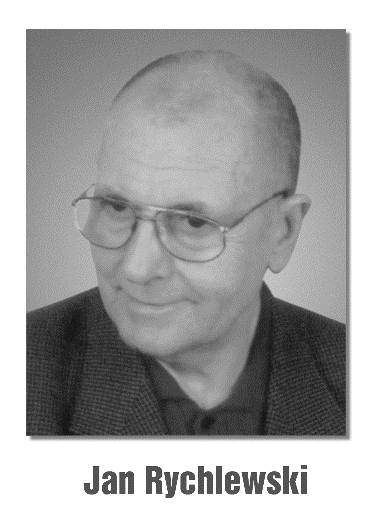
On May 23, we commemorate the 90th birthday anniversary of the late Professor Jan Rychlewski (1934–2011) and recall this distinguished scientist from IPPT PAN.
Professor Jan Rychlewski, born in Moscow in 1934 and died in Warsaw in 2011, was an outstanding figure who left his mark in the history of science, particularly in the fields of mechanics and applied mathematics.
Professor Jan Rychlewski graduated from the Faculty of Civil Engineering at the Warsaw University of Technology in 1958. His passion for science was already evident during his studies when he simultaneously explored mathematics at the University of Warsaw. His exceptional abilities and passion for science were noticed by Professor Wacław Olszak, whose assistant he became even before he officially graduated.
He began his academic career at the Institute of Fundamental Technological Research, Polish Academy of Sciences, where he worked in the team of Professor W. Olszak, where he dealt with non-linear mechanics of continuous media. In 1964, he defended his doctoral thesis entitled "Boundary resistance of helicoidal shells", and later that same year, he received habilitation based on his thesis entitled "Plasticity of bodies with step inhomogeneities". At the age of just 38, he was awarded the title of associate professor, a result of his intensive research work and success in supervising doctoral dissertations.
His scientific career was as impressive as it was dynamic. He was appointed associate professor in 1972, became a corresponding member of the Polish Academy of Sciences in 1973 and was promoted a full professor in 1984. As the head of the Laboratory of the Mathematical Theory of Materials at IPPT, he led research on the development of mathematical methods of mechanics for more than (over) three decades.
Professor J. Rychlewski was also active on the international stage. In 1983–1984, as a visiting professor – he cooperated with the Institute of Mechanical Problems of the USSR Academy of Sciences in Moscow, and in later years with Shanghai University. His scientific and educational work was invaluable for the development of relations between Poland and China in the field of science and technology.
A significant part of his professional assignments was related to the organization of scientific life in Poland. He held many important positions, including Deputy Secretary of the Faculty of Technical Sciences and Secretary of the Faculty of Mathematics, Physics, Chemistry and Astronomy of the Polish Academy of Sciences. He was also the Chairman of the Space Research Centre of the Polish Academy of Sciences, where his activities were associated with the construction of the Halley's Comet probe and the flight of the first Polish cosmonaut.
His scientific interests covered a wide range of topics. He began with specific issues, e.g., shell theory, and over time he turned to interdisciplinary issues linking science and philosophy, and including the theory of dimensions, the symmetry of cause and effect, and physical laws. He was the founder and editor-in-chief of the international journal 'Advances in Mechanics’.
His last years of professional life were associated with the University of Warmia and Mazury in Olsztyn, where he was the leading organizer and became the first dean of the newly established Faculty of Mathematics and Computer Science. Professor J. Rychlewski held this position until his retirement in 2004, leaving behind a lasting legacy of an active academic community and numerous scientific achievements.
Professor J. Rychlewski was not only a scientist but also a mentor and leader whose work influenced many generations of engineers and scientists. His approach to science, combining mathematical rigor with practical application in engineering, inspired numerous research and discoveries. As a scientist and academic teacher, he was respected for his knowledge, intuition and ability to convey complex concepts in understandable manner. His theoretical and applied works contributed to a better understanding of complex phenomena in mechanics, and served as the foundation and inspiration for further research in the field.
For his achievements, Professor J. Rychlewski was honored and recognized on numerous occasions by the scientific community. His scientific and educational achievements, his ability to combine theory and practice, and his commitment to the development of young scientists earned him recognition both at home and abroad. Memories of him are vivid among colleagues, students and all who had the opportunity to work with this remarkable scientist, educator and organizer of scientific life.
Professor Jan Rychlewski's legacy remains alive not only through his numerous publications and contributions to many fields of science but also through the institutions he helped to shape and the scientists he taught and inspired. His name and achievements remain inscribed in the annals of Polish and international science, serving as a proof that passion combined with knowledge can lead to extraordinary discoveries and change the world for the better.
It was exactly this combination that marked the entire work of Professor Jan Rychlewski, making him not only an expert in theory, but also a practitioner who was able to apply scientific theories to real-world engineering applications. His work contributed to the development of mechanics, applied mathematics and many other fields, transcending traditional boundaries of scientific disciplines and opening new paths for innovation and research. Professor Jan Rychlewski remains a role model of a scientist whose technical and scientific ideas continues to inspire the search for new solutions in the complex world of science and technology.
Biographical note prepared on the basis of: J. Ostrowska-Maciejewska, Rychlewski Jan, [in:] H. Altenbach, A. Öchsner (eds.), Encyclopedia of Continuum Mechanics, Springer, Berlin, Heidelberg, pp. 2193-2197, 2020, https://doi.org/10.1007/978-3-662-55771-6_344















